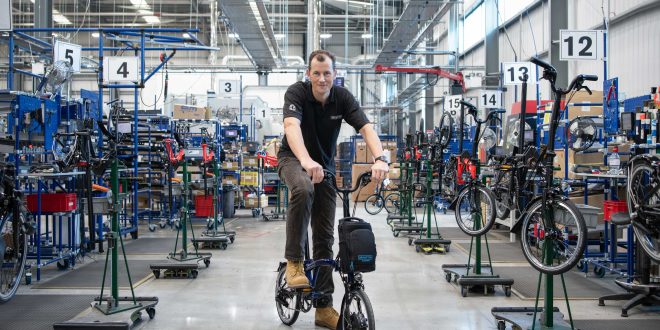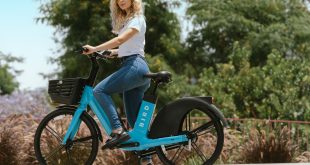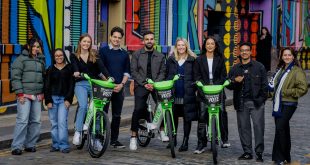Brompton CEO Will Butler-Adams on why the bike business should talk not in terms of toys, but instead tools for sustainable urban transport. By Graham Willgoss
This piece first appeared in the April edition of BikeBiz magazine – get your free subscription here
Walking straight off the Brompton factory floor in the west London suburb of Greenford, Will Butler-Adams is bubbling with enthusiasm. It’s seemingly his default setting, but particularly so for the business he’s in and what it can do for the way we live.
“There’s a lot to get excited about,” he explained, “Particularly for our industry. Our industry is feeling real pressure at the moment because it’s gone through a little bit of an overheating and they’re really hurting. But if we can just weather the storm, as an industry we are sitting at a really exciting time to contribute to solving some of the world’s problems. We’re so relevant.
“We’ve been slightly recreational and very nice to have. But we are moving from that to being super-relevant. Particularly when you introduce electric drive and cargo bikes. That whole opportunity for the bicycle, combined with electric drive, to have such an impact on how people live in cities all over the world is really exciting.”
Butler-Adams has been chief executive of the British folding bike firm since 2008. He joined with the title of new projects manager in 2002, after a chance conversation on the bus from Henley train station with the company’s then-chairman Tim Guinness. From a “young engineer looking for something interesting to do in life”, to overseeing the manufacture of nearly 100,000 bikes a year, he knows what he is talking about.
“And we’re talking about the bicycle business,” he said. “But we’re not talking about the bicycle. That is where we need to get to. The bicycle is the tool. But the really exciting thing is what it delivers. And we need to spend more time discussing that and as a business recognising the incredible impact it can have.”
Butler-Adams believes there is more the industry can do to help on that front.
In short: no more Mr Nice Guy.

“We need to be a little bit less nice,” said Butler-Adams.
And he has an example dear to his heart: “People believe that if they own a car, they have a right to park it in the public realm. But that space is quite valuable. It’s valuable for children, for people just sitting outside their home, playing, having a drink, bars, enjoying life. And the interesting thing is, even where it’s free, that’s completely preposterous. If you own a vehicle, you need to store it on your own land.
“There is no way anyone, certainly in a congested environment, should be able to just park their vehicle. Zero. Not allowed. Gone. We, as citizens, the majority of whom do not use cars on a daily basis, need that space for living. And we wanted to do a campaign [that was] nothing to do with cycling to remind people cycling isn’t what it’s about. I’m not in the cycling industry. I’m in the industry of living. Our mission at Brompton is to create urban freedom and bring a little bit of happiness. We happen to do that with a bicycle. But we get too caught up in ‘The Bicycle’.
“It’s not the bicycle, it’s what the bicycle does for you. And we need to spend more time communicating that, and the positive impact of this wonderful tool, rather than focusing on the Shimano XYZ drive and the hardtail/softail rubbish! It’s the simple joy of this tool. And not only that, it’s so efficient!”
Time to nut up or shut up
Butler-Adams’ heartfelt mission is to grow and promote sustainable urban transport with the intention of improving city dwellers’ lives everywhere – so much so that he has even written a book about it: The Brompton, Engineering for Change.
“I now feel I have experienced enough and seen enough, and I’m getting old enough not to care, and I say what I see,” he said.
So what does the 48-year-old chartered mechanical engineer, with an OBE for services to industry, want to see change?
“We’re only asking the industry to say the truth,” he said. “We haven’t even managed to do that. We don’t even need to exaggerate it, because it’s so stunning.
“All we’ve been doing is worrying about new tyres, new gear systems, the fact it weighs 200g less, when it’s actually just a bike that somebody sits on, so the weight is virtually irrelevant. As it happens, for our bike it’s quite important because you carry it. But for most bikes, it’s irrelevant to the average punter, unless you’re some amazing triathlete.
“But it’s wellbeing, life, climate change… you get hit by a bicycle, it might hurt, you break a bone. You get hit by a two-tonne car, it’s game over. That’s not a fake truth.”
It’s difficult to argue, especially in the face of an existential crisis or two.
“We have a climate crisis,” said Butler-Adams. “We need to use fewer resources, less carbon. What on earth are we doing talking about a 2,000kg electric car? We have a bike that weighs 15kg that can carry the same 90kg human being. 15kg versus 2,000? It’s fricking obvious! Never mind the space saving and everything else. So, I think the industry needs to be a bit more dynamic, take a bit more risk, upset a few people and just ring out a few home truths.
“Because we’re running out of being polite. We need to shine a light on the truth and open up the realities.”
Shifting momentum
There are also reasons to be positive. Butler-Adams points to the progress made in the past decade in London alone.
“We’ve seen a fantastic transformation where cycling has gone from being some weird, oddball participation either for people who were sort of hardcore greens or hardcore MAMILS – it was like you were one or the other – to becoming normal, mainstream,” he said. “[Now it’s] not odd at all. In fact, stunningly sensible! ‘Why the hell didn’t we do this years ago?’ And that is a real team effort. Politically, we’ve seen Boris [Johnson], Andrew Gilligan, Will Norman [fighting cyclists’ cause]; we’ve got the London Cycling Campaign, we’ve got mayors in Manchester and Birmingham, people across the board.
“But then you add to that momentum, two things: one, we’ve just been through a pretty horrific Covid experience. And like all tragedies there is a silver lining to the cloud, and the silver lining to that cloud is that citizens all over the world experienced what life could be like.”
The second cause supporting the case for micromobility momentum is global warming, but Butler-Adams identifies a third, in the cost of living crisis.
“I’m not expecting us in London to go from 5% cycling to 15% in the next five years,” he said. “That’s a bit unrealistic. Or in the UK from 2%, or wherever we are, to 10%. But what I care about is progress.
“I’ve been in business [a long time] and people always exaggerate and say they’re going to change the world in two seconds flat. That doesn’t really matter. What matters is that in 12 months’ time, we’re in a better place. And 12 months after that, we’re in a better place. If all we’re doing is making progress and improving the situation, we’ve done our bit. What is not acceptable is to go backwards. We’ve got to keep going forwards! It might be a bit harder, and there might be some moments when we go faster and somewhere we get a few knockbacks.”
Butler-Adams has been no stranger to knockbacks. The sort of dramas that he might have reasonably expected to be a ‘once-in-a-career event’ have kept on coming: Brexit, a global pandemic and now the pressure of rapidly rising inflation. Brompton has invested in its own data analytics in an effort to be better at forecasting because that, said its main man, is an important competitive advantage:
“If you are a bike manufacturer or retailer and your forecasting is wrong, you suddenly find that all your cash is tied up in the wrong product,” Butler-Adams explained, “and then you’re left vulnerable.
“So as a business grows, it’s like Whac-A-Mole. Weird things come your way, like your finance capability, your R&D, or your manufacturing. But at the moment, it’s data, forecasting, analytics. Taking that data and turning it into more credible, more accurate forecasting for our industry as a whole, and certainly for us, is important. It’s not glamorous, it’s not all shiny, but you get that wrong and it’s a big lesson we’ve learned. The data is out there. And we’re investing to help ourselves.”
Read more: Euro Mobility Festival gains momentum for 2023
Our time up, that broader idea of helping ourselves – and everyone else – via the choices we make is what Butler-Adams brings it back to.
“I just want to remind everybody that the consumer is everything,” he said. “We, the humble voter, the humble consumer, have the power to determine our future. And if we want cities that are quieter, cleaner, calmer, healthier, happier places, then we need to choose that. Vocalise. Vote! Buy bikes. Animate – whatever it happens to be. But don’t just sit there and accept the status quo.”
Not accepting the way things are is, after all, where engineering for change begins.
 micromobilitybiz Delivering news updates to the micromobility industry, focusing on e-bikes, e-scooters and green transport
micromobilitybiz Delivering news updates to the micromobility industry, focusing on e-bikes, e-scooters and green transport




